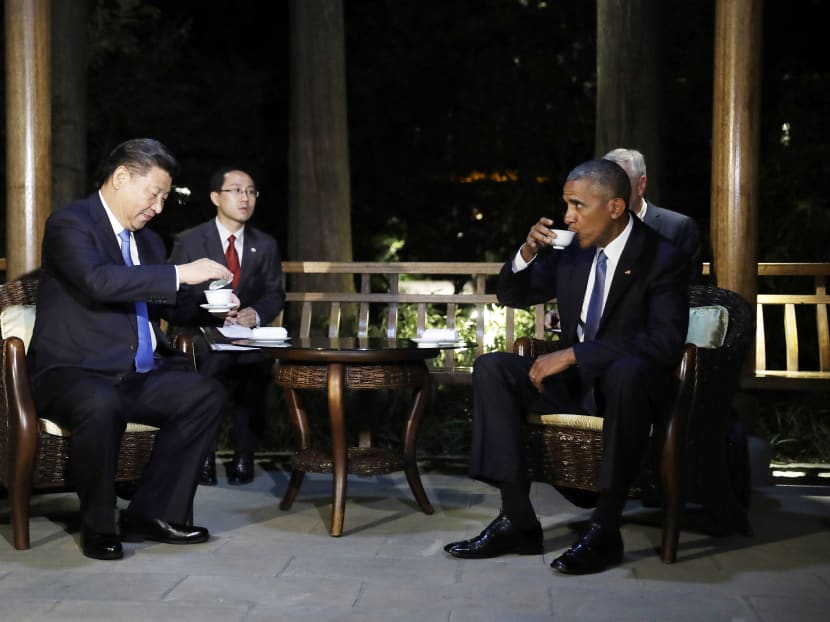US-China relationship lacks strategic trust: PM Lee
SINGAPORE — While the United States and China share deep economic interests, the two major powers lack strategic trust, said Prime Minister Lee Hsien Loong, who added that the Chinese “deeply believe” that Washington is trying to contain Beijing.

US President Barack Obama and Chinese President Xi Jinping at the West Lake State Guest House in Hangzhou in eastern China’s Zhejiang province on Sept 3. Prime
Minister Lee Hsien Loong noted that Mr Obama and US Vice-President Joe Biden have spoken to Mr Xi at length on different occasions, but it was not clear what the nature of their relationship was or how directly they were able to discuss issues. Photo: AFP
SINGAPORE — While the United States and China share deep economic interests, the two major powers lack strategic trust, said Prime Minister Lee Hsien Loong, who added that the Chinese “deeply believe” that Washington is trying to contain Beijing.
In a Time magazine interview last week that focuses largely on regional and international issues, Mr Lee noted that while the US and China have various cooperation mechanisms and communication channels that extend to top leaders, there remains mutual suspicion on both sides.
“There is an absence of strategic trust in the sense that the Chinese are convinced that you are trying to slow their growth, and you are convinced that the Chinese may do something unpredictable,” said Mr Lee.
“It does not mean that they want to fight you, but they may push in a direction which is not in your interest, including in the South China Sea. How do you establish enough dialogue in order to overcome that? It has to happen at the top.”
When Time’s editor-at-large Ian Bremmer expressed surprise about the point that China believes the US does not want it to grow and is trying to constrain it, Mr Lee replied: “I think they deeply believe that.”
Mr Lee noted that US President Barack Obama and Vice-President Joe Biden have spoken to Chinese President Xi Jinping at length on different occasions, but it was not clear what the nature of their relationship was or how directly they were able to discuss issues such as North Korea’s nuclear programme. The same applied for regular strategic dialogues between Chinese and American ministers in charge of foreign affairs, defence and economic issues.
“I am not sure the degree to which you are able to engage and come down to brass tacks,” said Mr Lee. “The one saving grace ... is the substantial economic relationship,” he added, noting that China has lent the US trillions of dollars so Beijing would not want the American economy to crash, and the US also does not want to lose its many business links with China. This was unlike the US’ relationship with the Soviet Union during the Cold War.
“Whether that (economic ties) is enough to counteract the tensions which will arise, it is difficult to say. I hope so; at least it will restrain both sides,” said Mr Lee. “If you have a very hot issue, like over Taiwan, then of course that is a different proposition. But short of that, economics is one of the important items in the overall bilateral relationship, and the linkages have to be exercised.”
On multiple fronts, such as computer hacking and maritime security, ties between China and the US have frayed during the seven-and-a-half years of Mr Obama’s presidency. The friction has worsened since the ascension of Mr Xi as a powerful nationalist leader in 2013.
China claims most of the energy-rich South China Sea, through which about US$5 trillion (S$6.9 trillion) in ship-borne trade passes every year. Beijing has been building artificial islands in the territory, including new airstrips, which has rattled nerves around the region. Brunei, Malaysia, Taiwan, Vietnam and the Philippines also have claims.
Washington has conducted freedom-of-navigation operations close to the artificial islands Beijing has built and has repeatedly called on China to respect a verdict by an international tribunal in The Hague that said China’s claims to most of the waters had no legal basis. China had vowed to ignore the ruling, describing it as “waste paper”.
The issue has also threatened to undermine the Association of South-east Asian Nations (Asean), with some member states supporting China and blocking consensus regarding territorial and maritime disputes in the South China Sea.
In the Time interview, Mr Bremmer observed that China has “made incremental gains consistently” on the issue by backing up its assertive moves in the disputed waters with continued economic engagement of countries in the region. In response, PM Lee said that each of the other claimant states has a broader relationship with China, and “none of them wants to push it to the brink”.
“So there is this game which will be played. How do you move, what are the trade-offs, and what are the alliances or partnerships which try to get formed and try to get broken? The Chinese are quite clear what their interests are and very consistent on pushing their interests.”






